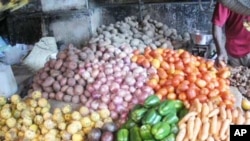Higher food prices and volatile commodity markets are here to stay. That’s the conclusion of a new report from the U.N. Food and Agriculture Organization [FAO] and the Organization for Economic Cooperation and Development [OECD].
The report said a good harvest in the coming months “may keep prices below the extreme levels seen earlier this year.” But over the next 10 years, cereal prices could be 20 percent higher and meat prices 30 percent higher than in the last decade.
“We’ve been saying this probably for the last two or three years, since the run-up in prices in 2008,” said Merritt Kluff, senior economist in the FAO’s Trade and Markets Division.
Driving factors
Kluff said, “It’s largely contingent on…high energy prices, on the one hand, which [are] affecting…input costs and also demand for biofuels on the other side. That’s one factor. The underlying factor probably is rapid growth in emerging countries in Asia and South America, which is putting upward pressure on the demand for food and feed.”
In addition, agriculture productivity has slowed.
“We don’t see that picking up, despite the fact that there’s a lot of potential for higher supplies from developing countries, in particular, where there are large yield gaps,” he said.
Profits and losses
Some will benefit from the higher commodity prices, but others will suffer.
“Certainly, net food producers will be clear beneficiaries literally globally. Where price transmission from international markets to domestic markets is actually efficient, producers will benefit clearly from this. And we should see some, considerable, in some cases, supply response to these high prices,” he said.
However, higher fertilizer costs could cut into the producers’ profit margin somewhat.
“Those hurt, of course, are the net food buyers certainly in cities and urban communities, but also even in rural settings where people who work for farmers or people who are working in the rural area will pay higher food prices and they will lose. Some of them very poor, unfortunately,” he said.
Instability
Higher food prices triggered riots in many countries in 2007 and 2008. The food security issue is also linked to the uprising in Tunisia. Kluff said the risk of violence over food prices and volatility remains.
“Certainly, it does. It’s much muted right now because fortunately we’ve had very decent crops and [the] supply disposition situation for rice looks ok. The major commodity that’s currently being affected is corn, or maize, and its prices are certainly higher than they were before. But that’s mostly a feed grain crop, by and large. Although it does have knock-on effects to the other commodities and they’re high, too,” he said.
Kluff said fortunately rice, a food security crop in Asia and parts of Africa, is not being dramatically affected right now.
G20
The G20 agriculture ministers meet in Paris next week. It’s the ministers’ first-ever official meeting as a group and Kluff expects them to address the link between food security and higher commodity prices.
“This is fundamental to the issue. In fact, we covered this issue of volatility last year in our report and we covered it again in this year’s report primarily for this reason,” he said.
The FAO and OECD have proposed some solutions, including better informing buyers and traders.
“We need to increase productivity growth, in particular, in developing countries. And we need to get greater information, market information, from countries so that we actually know what’s going on,” said Kluff.
He warned that countries that have imposed food export restrictions out of fear of higher prices could actually make matters worse.
FAO director-general Jacque Diouf said the “key solution” to price volatility “will be boosting investment in agriculture and reinforcing rural development in developing countries.”




